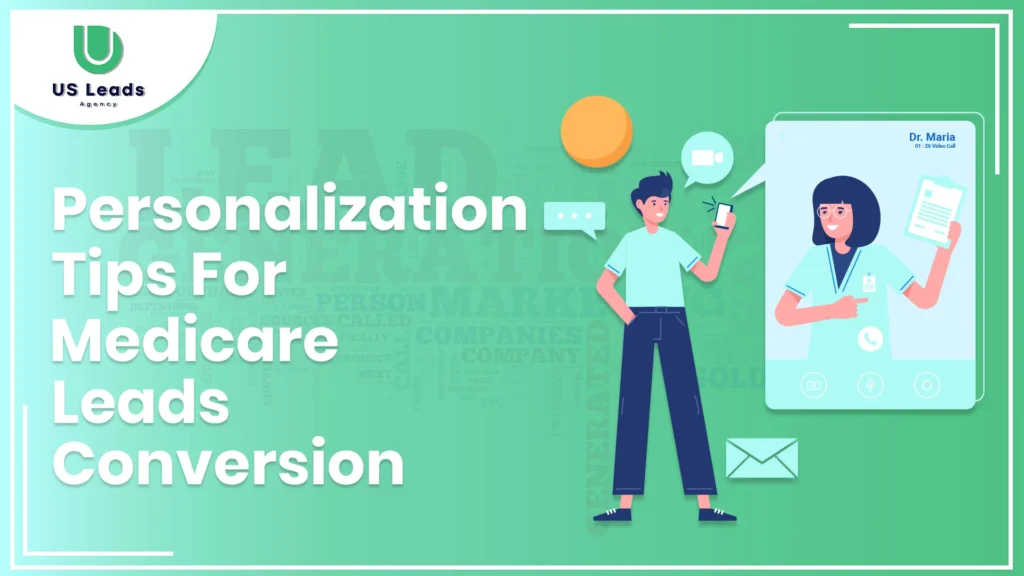
In 2024, personalization remains a pivotal factor in Medicare lead conversion. With 76% of consumers preferring to purchase from brands that personalize user experiences, implementing tailored strategies is essential for success. By segmenting leads, tailoring communication, and leveraging data-driven insights, businesses can effectively address the unique needs of each prospect.
This article explores actionable personalization strategies to convert Medicare leads into loyal clients.
Key Takeaways:
- Segment Medicare leads based on age, income, and location for targeted personalization.
- Use CRM tools and AI to gather insights and automate follow-ups.
- Tailor communication via emails, calls, and social platforms to address specific needs.
- Offer one-on-one consultations to build trust and confidence in Medicare plan decisions.
- Showcase personalized testimonials to reinforce credibility and success stories.
Table of Contents
Understanding Medicare Leads:
Medicare leads refer to potential customers who are eligible for Medicare and are interested in learning more about or enrolling in Medicare plans. These leads are essential for insurance agents and businesses in the Medicare sector to identify and convert potential clients into policyholders.
Importance of Personalization In Medicare Leads:
Personalization involves customizing interactions to meet individual prospects’ needs and preferences. In Medicare sales, this approach can significantly enhance engagement and conversion rates.
Key Personalization Strategies To Convert Medicare Leads:
To implement effective personalization in Medicare lead conversion, it’s crucial to begin with strategies that build a foundation for addressing the unique healthcare needs and preferences of each prospect.
1. Segment Leads Based on Demographics:
Understanding your target audience is the cornerstone of personalization. Segment Medicare prospects using:
- Age Groups: Seniors aged 65+ and younger individuals with disabilities.
- Income Levels: Offer solutions based on financial capacity.
- Location: Tailor plans to regional Medicare offerings and regulations.
Example: Rural seniors may prefer plans with extended transportation coverage, while urban residents might value accessible provider networks.
2. Use Data To Understand Individual Needs:
CRM tools and analytics help businesses personalize outreach based on prospect behavior and preferences:
- Track email clicks, ad responses, and previous interactions.
- Offer tailored solutions for health priorities (e.g., chronic condition plans).
Tools like Hub Spot and Zo ho CRM streamline tracking and follow-ups.
3. Personalized Communication Channels:
Medicare prospects use diverse platforms; tailor communications accordingly:
- Emails: Address leads by name with targeted subject lines, e.g., “John, Explore Your Ideal Medicare Plan!”
- Calls: Train agents to address specific prospect needs.
- SMS & Social Media: Engage tech-savvy seniors with reminders and comparisons.
4. Tailored Content Creation:
Create content that educates and resonates with Medicare leads:
- Blogs: “Top Medicare Plans for Heart Patients in 2024.”
- Guides: Location-specific plan comparison PDFs.
- Videos: Explainers addressing common Medicare questions.
Use storytelling and client testimonials for emotional engagement.
5. Offer Personalized Medicare Consultations:
Direct consultations ensure customized solutions. Agents can:
- Assess individual health needs and preferences.
- Explain plan options in simple, tailored terms.
Use checklists to ensure all lead-specific requirements are addressed.
6. Leverage AI and Automation for Personalization:
AI tools make large-scale personalization efficient:
- Chat bots: Assist with plan inquiries.
- Automated Campaigns: Nurture leads with relevant follow-ups.
- Personalized Website Content: Display tailored plan options based on behavior.
Example: A visitor researching prescription plans can see related content on managing drug costs.
7. Custom Follow-Up Strategies:
Thoughtful follow-ups show care and professionalism:
- Email summaries after consultations.
- Calls that reflect previous discussions.
- Timely reminders for enrollment deadlines.
Address unresolved concerns promptly and provide further resources.
8. Build Trust with Personalized Social Proof:
Showcase testimonials and success stories relevant to your leads:
Example: “Ahmed, a retiree from Florida, saved $1,500 annually by switching plans. Discover how you can save, too!”
Conclusion – Personalization Strategies To Convert Medicare Leads:
Personalization is no longer optional in Medicare lead generation it’s essential. By leveraging segmentation, data insights, personalized communication, and AI, businesses can build meaningful connections that drive conversions. These strategies not only boost engagement but also foster trust and satisfaction among Medicare beneficiaries.
FAQs:
Why is personalization so important?
Personalization enhances engagement, increases conversion rates by up to 30%, and improves customer satisfaction by addressing individual needs.
What is the best way to segment Medicare leads?
Segment leads based on demographics, including age, income levels, and location-specific Medicare plan availability.
